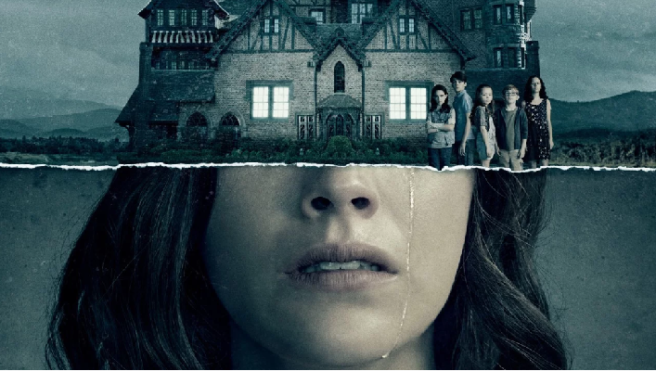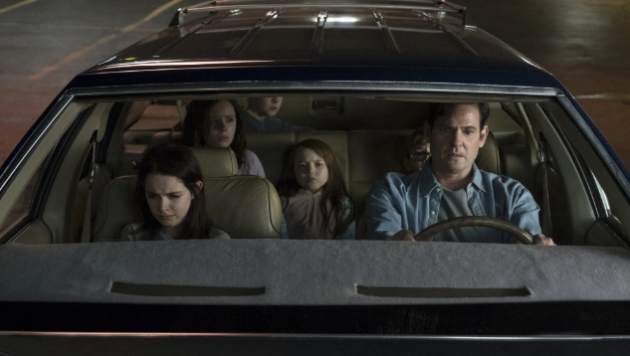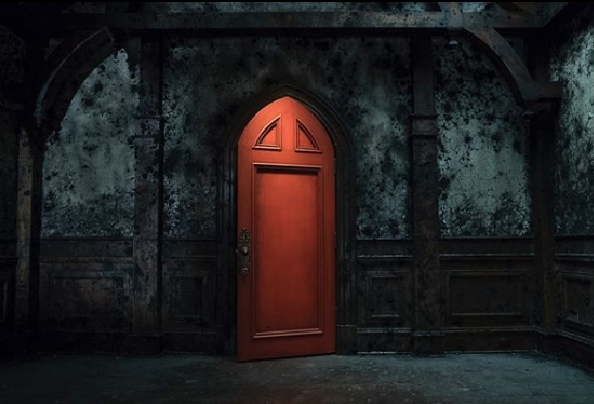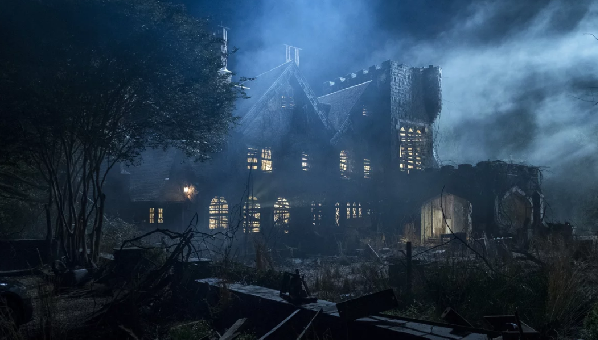
The Haunting of Hill House review – The perfect binge for Halloween
‘No live organism can continue to exist sanely under conditions of absolute reality’
From the opening line, Netflix’ new offering The Haunting of Hill House grips the audience, enrapturing viewers with its amalgamation of family drama and pure unadulterated horror. Based on the 1959 book by Shirley Jackson, Mike Flanagan adapts the series into a sharp and modern offering which has earned rave reviews from critics all round.
Flanagan writes, produces and directs the 10 part series which King of Horror Stephen King refers to as a ‘work of genius’ In past versions of the story, we were only given the haunting itself, but Flanagan’s spin grants us the aftermath which leaves just as much of a chill in your bones. The emotionally charged series avoids the blood and guts of the gothic-horror novel but it remains a visceral viewing nonetheless.
The narrative structure flicks between the past and the present over a 20 year timeline, each episode focuses on the existential, but nonetheless frightening journey of the Crain family trying to come to grips with the ghosts of their past.
It begins with five children who are tragically ripped apart and left with lifelong scars and repressed ghosts from their childhood in Hill House.They are subsequently brought together by a death, and must then realise the complicity of the house in each of their failings as adults.
In 1992, when the kids are still at the titular house, they're plagued with visions of ghosts, zombies, and supernatural beings which affect each of them in alternative ways.The intermingling of the real and possibly imagined creates an atmosphere of anxiety and fear, where the viewer cannot decide which is worse: the horrors of the mind or the darkness of reality.
Olivia and Hugh Crain (played by Carla Guigino and Timothy Hutton) move into Hill House in the hopes of ‘flipping it’- renovating it and selling it for profit. Predictably, their dream becomes a total nightmare, and the house never becomes a home. They have five children- non-identical twins Nell and Luke, Steven, Shirley and Theodora.
Within a month Hugh takes the kids and flees, leaving Olivia behind whose sanity has crumbled within the walls of the home. The children grow up, and Hugh still refuses to tell them how their mother died that fateful night.

Each of the children has ghosts which plague them even as time moves on. For example, Luke’s dependence on drugs leads to bitterness among his siblings, and Steven’s horror novel about the house causes anger, as the family believe he is capitalising on their grief. The children act as the narrative backbone, and there are strong performances from each cast member regardless of age.
Mike Flanagan uses genius plot devices to maintain the massive tension for an entire ten episodes, and touches heavily on the notion of trauma informing a person’s future as well as the fundamental notion that there are infinite types of ghosts in every form imaginable. Attention to detail is phenomenal, from the cinematography to the character arcs, there’s even a cameo from Shirley Jackson in the form of her infamous novel The Lottery, which Theo is seen reading in episode one.
Flanagan uses oft-seen horror tropes and concepts such as dark corridors, old rickety mansion, locked doors (the red door will steal the breath out of your lungs), monsters under the bed among others. There are nods to Stephen King throughout, from the use of twins (The Shining) to the use of locked doors and keys.
The designs of the figures that appear are absolutely terrifying, I won’t give anything away but there’s a woman with stringy black hair, a muffled scratchy voice and a crooked neck that will haunt my imagination for life. Flanagan investigates the idea of fault, such as the tragic neglect of Nell in her all-consuming pain of the haunting, in alternating ways, as well as the concept of childhood leaving a stain on your adulthood.
It begs the question, what does one owe to others who shared the same experiences, and what is the true limit of family. The series is intensely psychological, and explores the Freudian notion of the psyche in the form of a house.
Olivia, when designing their ‘forever home’, refers to a house as a body which “works together to keep you healthy.” This insinuates that the children’s trauma from their childhood home has seeped into every part of their present beings- mentally and physically.

Family loyalty is called into question, and foreshadowing is beautifully woven into the series through skilled storytelling. As the children flee the house, Steven’s father tells him to “keep your eyes closed, no matter what.” Steven later brings this into his adulthood, becoming a sceptic and never believing in the paranormal occurrences of his siblings and parents, instead blaming their unstable mental health.
Doubt and the importance of believing in the words of children prove to be of imperative value throughout. Absolutely zero comfort is given throughout, Flanagan never answers the question on whether the apparitions are real or imagined.
Contributing prodigious cinematography matched with exceptional writing, The Haunting of Hill House parallels family drama with an impressive horror story, and successfully morphs a classic into the modern world.

The show has already made a massive impact- on both the genre itself and those who have seen it. Talks are already in place for a possible season two.
High quality, psychologically charged horror has been steadily growing: Get Out is a landmark much needed change in horror, for example, as is the brilliantly original tour de force that is A Quiet Place.
Hill House is perfect for Halloween, but just don’t watch it alone in your house or you may have to move out.






